Teach Your Dog To Talk With Hunger For Words Dog Voice Buttons
Since the day I brought Diesel home as a puppy, he always had so much to say. He talks when he’s sitting, laying down, playing…,you name what he’s doing, he’s probably talking, ha! When we added Annie to our family, even though she’s not as vocal as Diesel, she does talk to us, but only when she really wants something. She literally came up and pawed me and whined at me as I wrote this sentence. Talk about timing, ha!
Fast forward to March 2023, I got to meet someone pretty cool. I had the opportunity to meet Christina Hunger, founder of Hunger For Words and the famous talking pet buttons! You may have even heard of her dog, Stella, the Talking Dog! They’re the originators of the talking dog movement. I had seen others talk about dog button training before and had always wanted to try it since I have two dogs that vocalize a lot and are super smart!
In this post I’ll be sharing all about our experience with Hunger For Words talking pet buttons, how you can teach your dog to talk with buttons and tons of helpful tips that I learned from Christina herself!
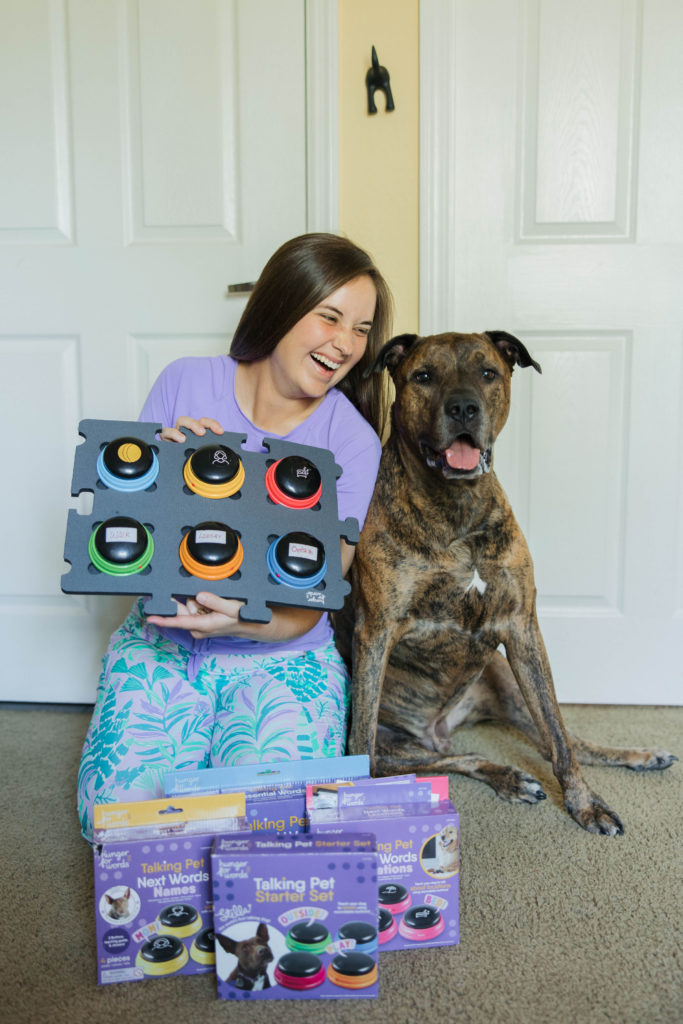
About Hunger For Words
Christina Hunger is a speech-language pathologist who helps children learn ways to improve their communication. After she adopted her dog Stella in 2018, she saw some communication similarities between Stella and young children before they begin to speak.
She then decided to try out a few recordable buttons with everyday words that Stella knew like “outside”, “play” and “water” to see if she could translate and communicate what she was hearing onto a helpful device. After much progress, Stella can now say 45+ words and put together different phrases, which honestly blows my mind. As someone who is constantly learning new dog enrichment ideas and dog training techniques, this area of communicating was one that I didn’t know was possible until I met Christina.
Christina truly believes that everyone has a voice and should have access to tools to help them communicate their wants and needs, especially dogs! Her techniques focus on learning and building a foundation that sets your pet up for success. Before we dive into what we learned and how you can teach your dog to talk with buttons, next is a quick breakdown of the different types of dog speech buttons and other helpful products available to help you and your dog learn together!
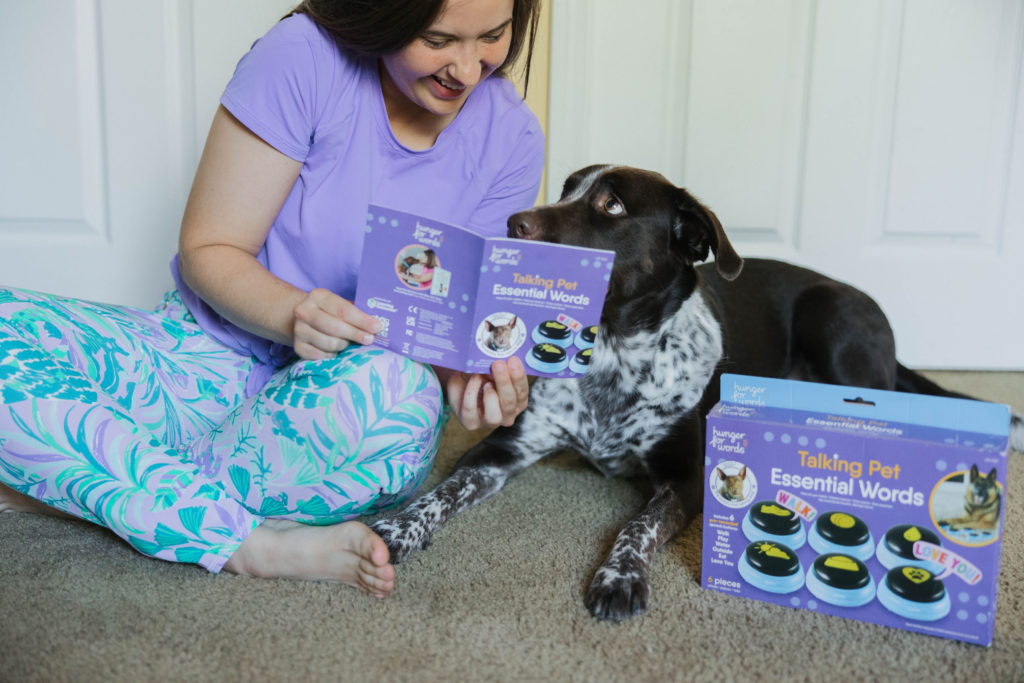
Hunger For Words Products:
Hunger For Words has so many different products that help you learn as much as you want with your dog! Below is a list of everything available (we have it all!) and I’ll go into more detail in this post for the ones we’ve used:
- Hunger For Words Talking Pet Starter Set (recordable dog buttons)
- Great for getting started!
- Hunger For Words Talking Pet Essential Words (prerecorded)
- Great for getting started!
- Hunger For Words Talking Pet Mat
- As you build your dog’s vocabulary, you can connect multiple dog communication button mats to hold all of your dog’s voice buttons in one place!
- Hunger For Words Talking Pet Doorbell
- Hunger For Words Talking Pet Next Words – Locations (recordable)
- Intermediate/next level after starter set/essential words
- Hunger For Words Talking Pet Next Words – Names (recordable)
- Intermediate/next level after starter set/essential words
- Hunger For Words Talking Pet Goal Tracker
For all of the pet talk buttons you will need two AAA buttons per button!
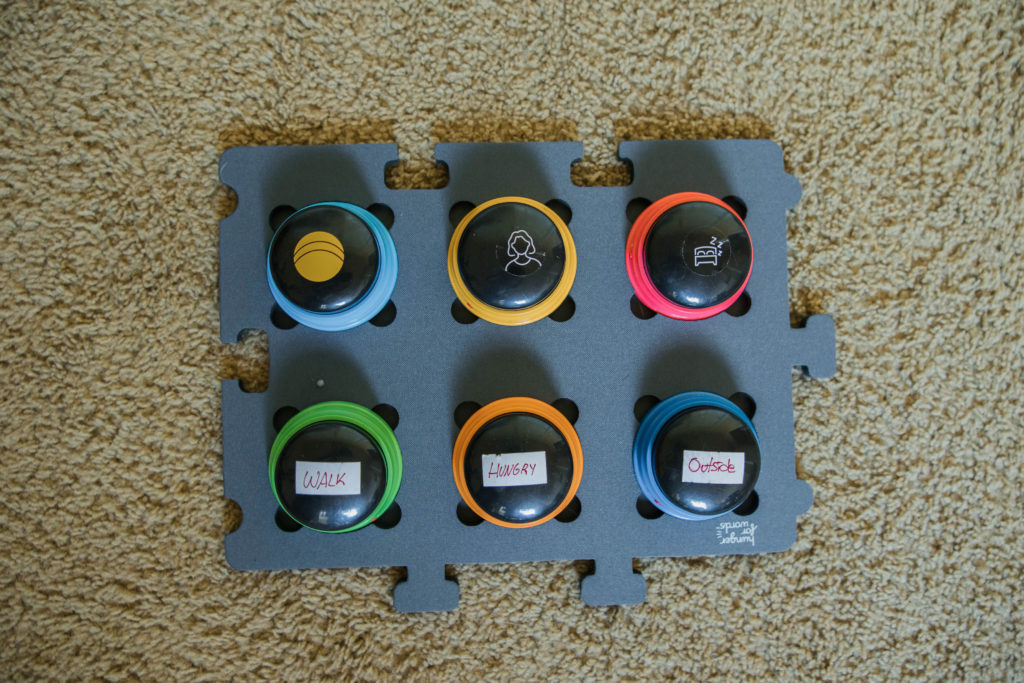
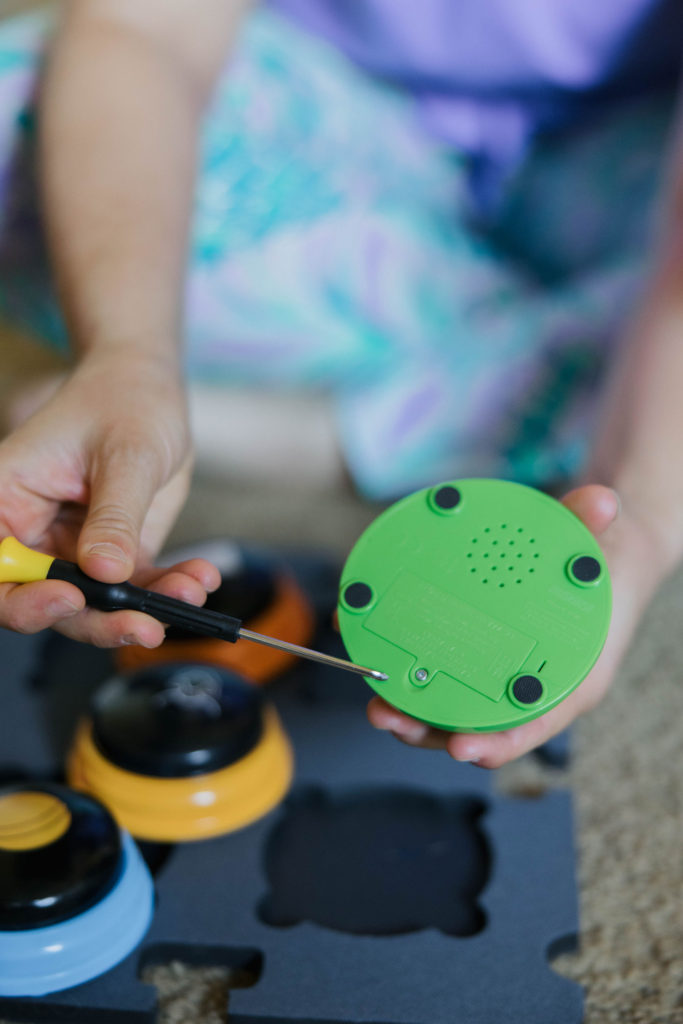
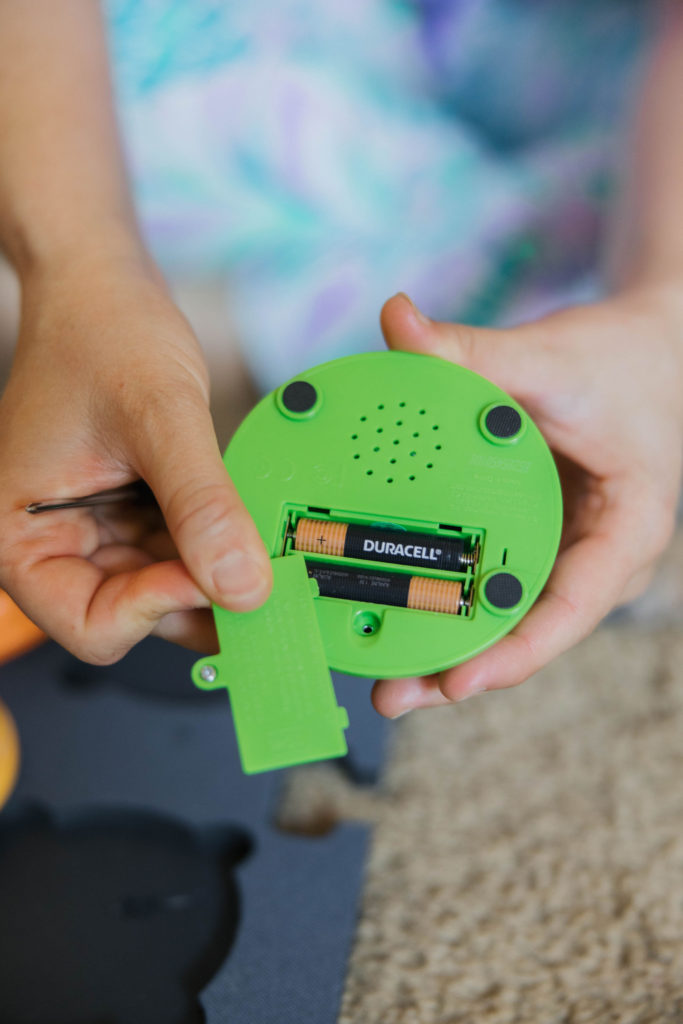
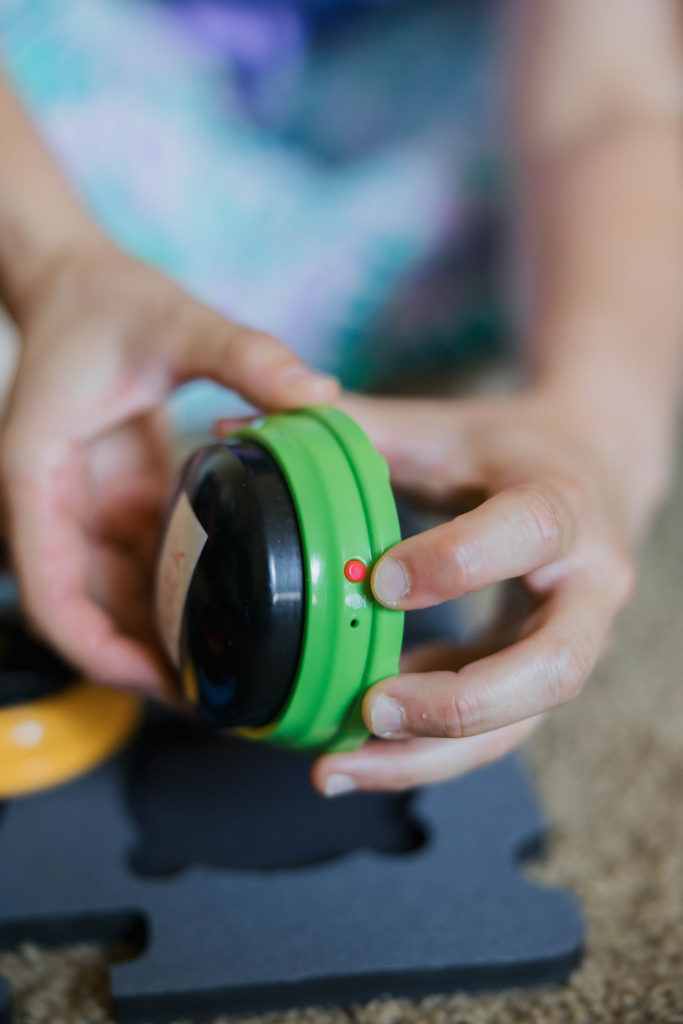
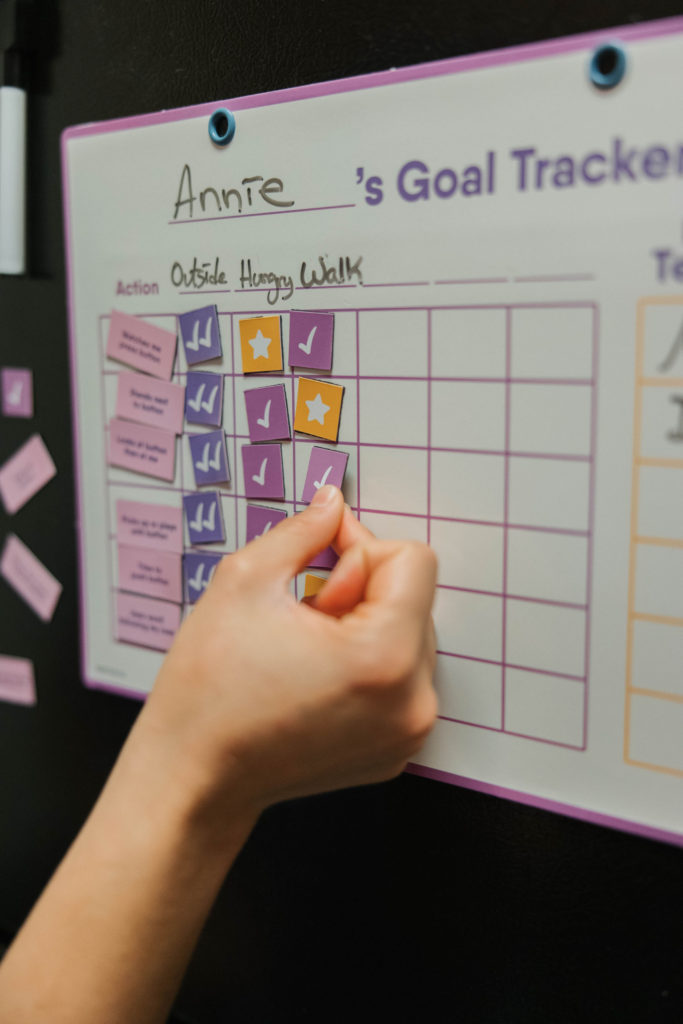
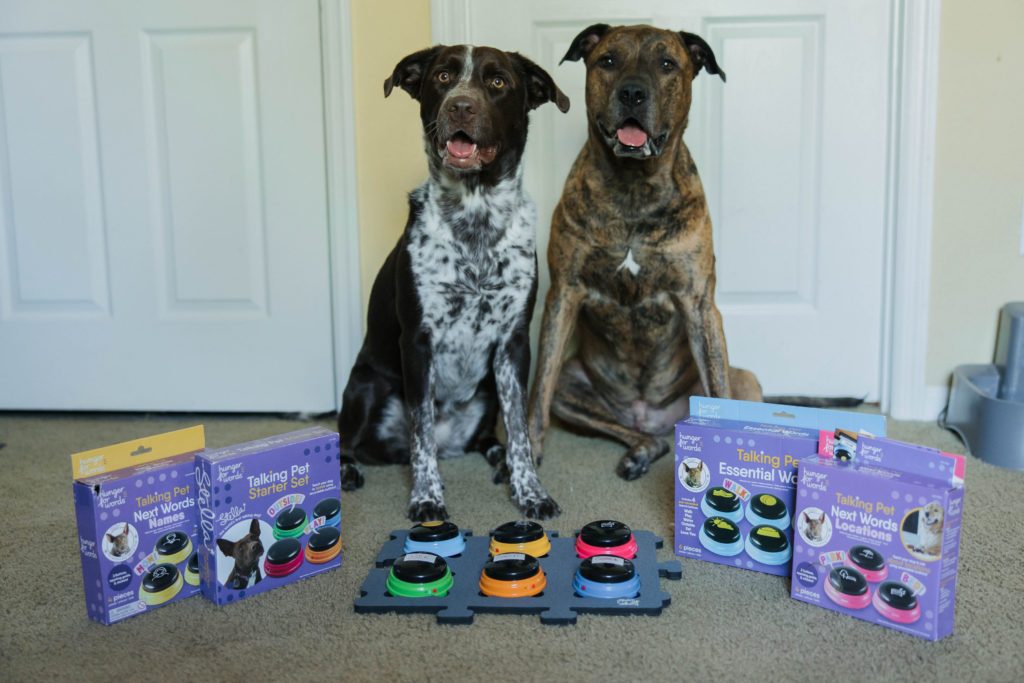
How To Teach Your Dog To Talk With Buttons Step 1: Modeling
When I started learning how to teach my dogs to talk with buttons, I wanted to start with the recommended Hunger For Words Talking Pet Starter Set because that set has recordable dog buttons.
Since my dogs know my voice, I thought, what better way to start than for them to hear my voice, but from a new device. For our dog button training, the first step that Christina recommends is to identify words that you use all the time and to start with those.
For example, the first words I chose were:
- Outside
- Walk
- Hungry
- Play
Once you’ve chosen your first words, you’ll want to pick one to start with and begin the process of “Modeling”. Modeling is where you show your dog what you want them to do with the buttons by doing it with them. For example, we started with the word “outside”, so every time my dogs needed to go outside, I would say the word “outside” like I always would but also add their button and phrases like “Do you want to go outside?” “Would you like to go outside?” and push their buttons immediately after. This starts the association of the word with the button. They already recognize the word from hearing it in everyday life, but now, you’re asking them to transfer that word to an action using the dog button.
In every set of dog speech buttons, comes a guide written by, Christina sharing tons of helpful tips for the words included or for that certain product (like Locations or Names) to aid in teaching your dog! She also wrote a book titled How Stella Learned To Talk where she shares her journey with Stella, along with more helpful tips!
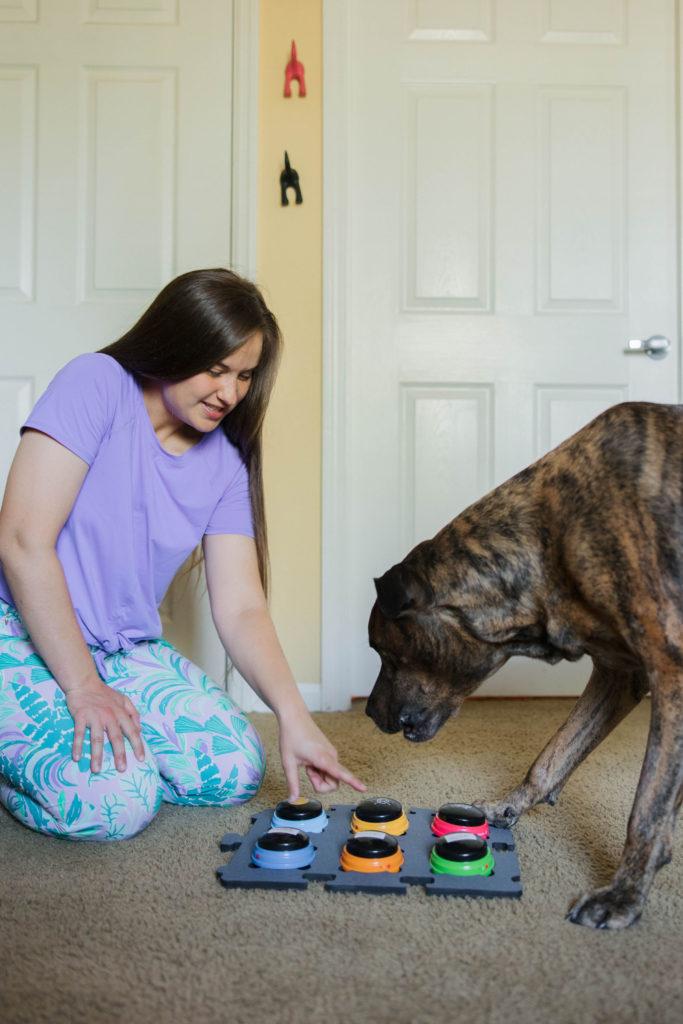
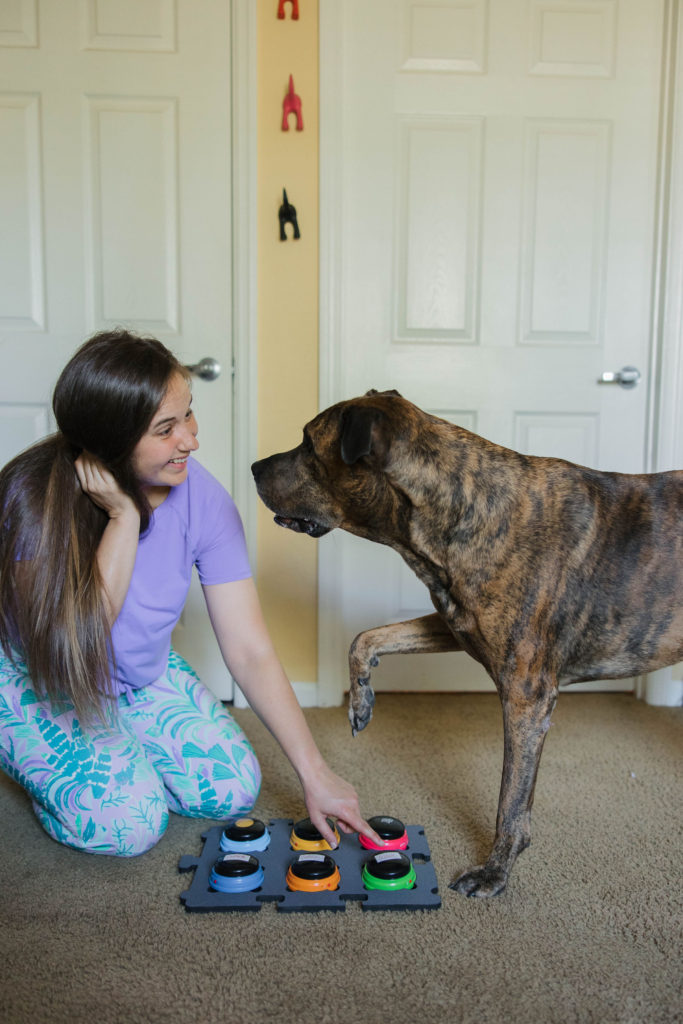
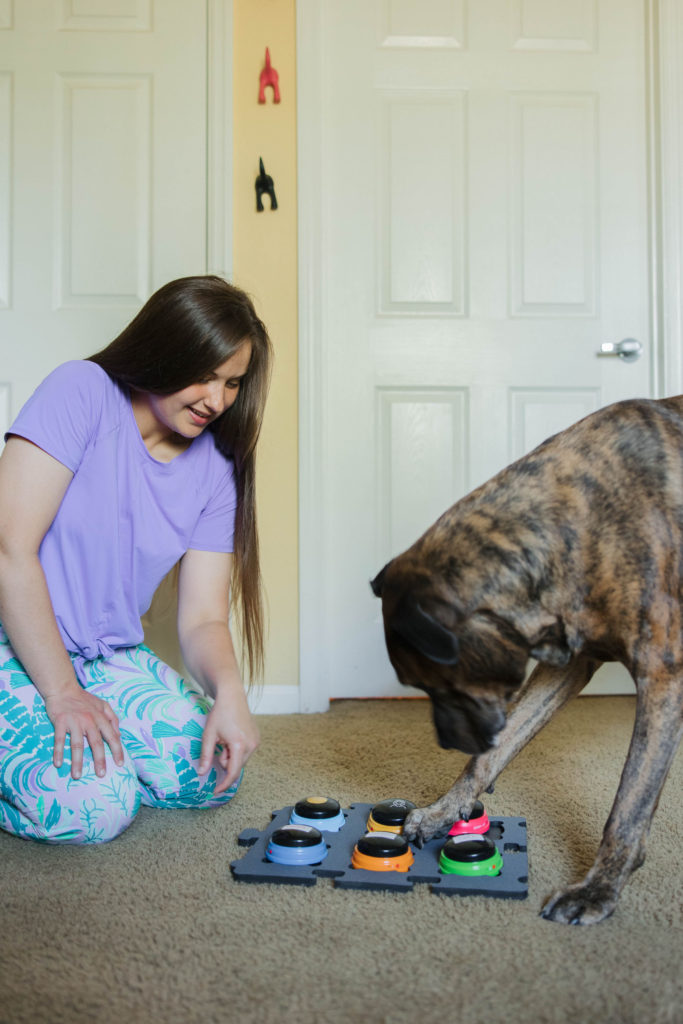
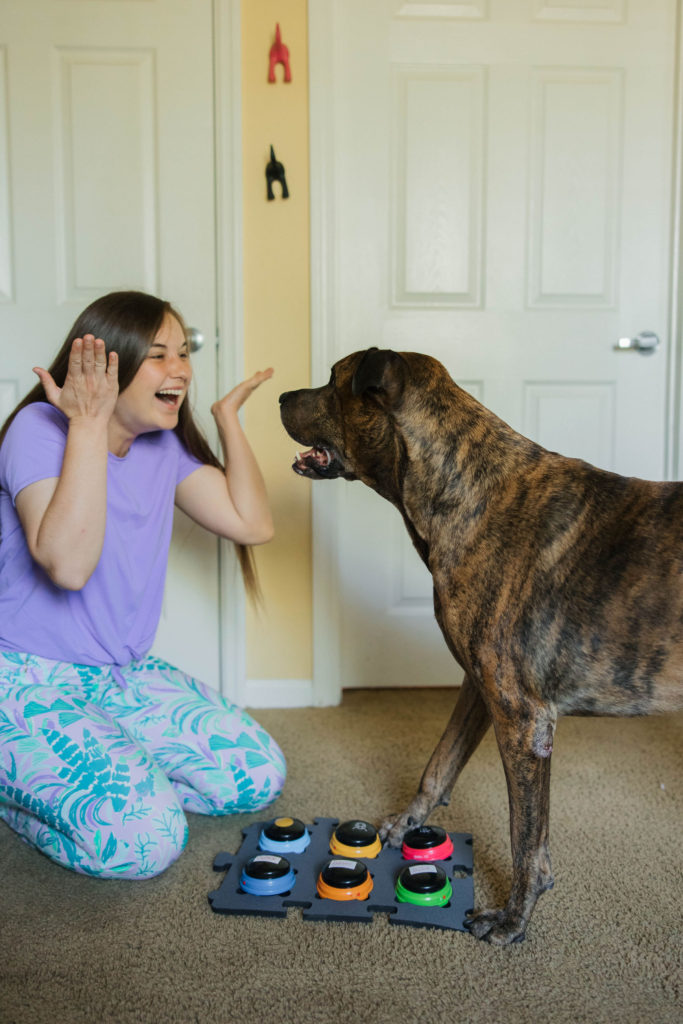
How To Teach Your Dog To Talk With Buttons Step 2: Pausing
The next step in teaching your dog to communicate with buttons is to take time to pause. Now that you’ve started the modeling process, from here you will begin to give your dog the opportunity to show where they are in their learning process by adding a 10-15 second pause after asking your dog what they want. For example, asking your dog: “Do you want to go outside?”
If your dog immediately pushes their Hunger For Words communication buttons, that’s amazing! However, don’t be discouraged if they don’t. When I first started adding in the pause, Diesel and Annie both looked up at me, then around, very unsure of what I wanted. If your dog doesn’t push the button after that initial pause period, you can try pointing to the button while saying the word out loud or tapping the button (without initiating the sound from the button) and saying the word out loud to give your dog a hint. For me, tapping the button helped the most!
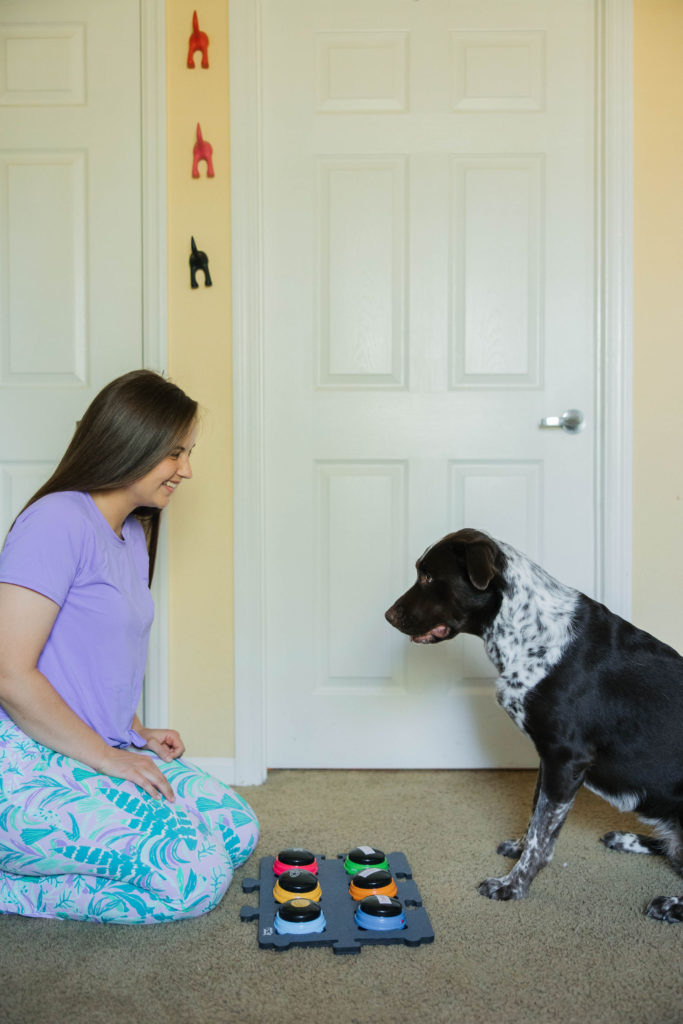
How To Teach Your Dog To Talk With Buttons Step 3: Patience
The third and most important step in learning how to teach your dog to talk with buttons is to have a lot of patience. Both of my dogs are very smart, but with anything new, it takes time to get the hang of it!
We had many moments where we would make progress with one button and then when I added in a second, they would get a little confused and unsure of which buttons to push. We would then go back to just one and using the same helpful steps: modeling, pausing, and of course, patience.
Similarly with patience is consistency. To teach your dogs to talk with buttons, you need to be using them every single day. Now, I’ll be honest, life totally gets in the way sometimes and I don’t always use them everyday; but I do try to! Always have the mindset that you’re doing something fun with your dog and with time you’ll see progress!
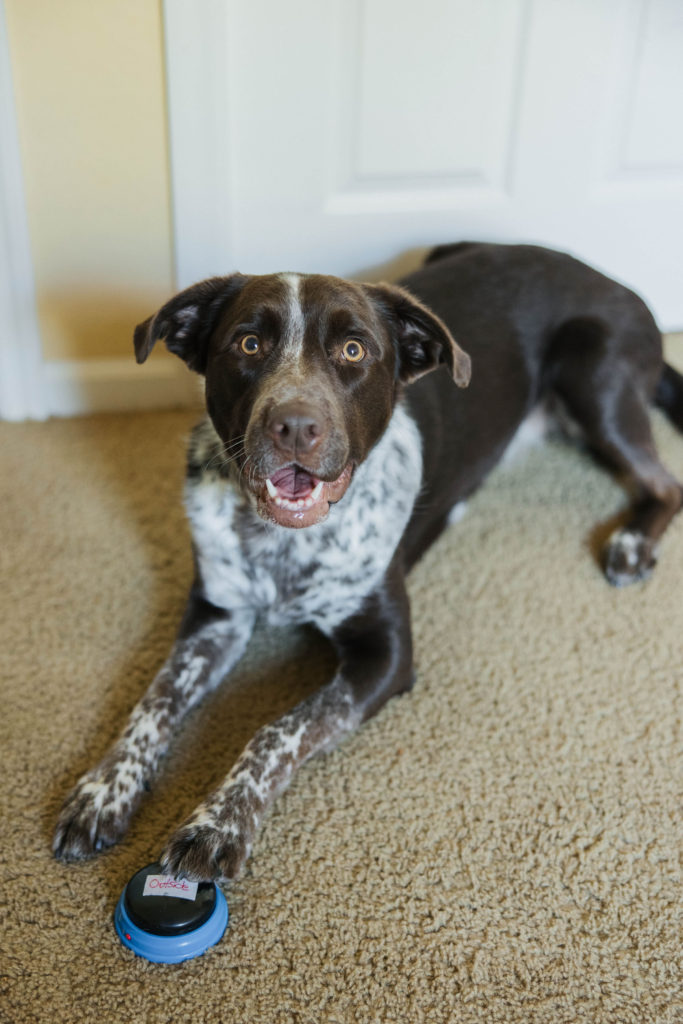
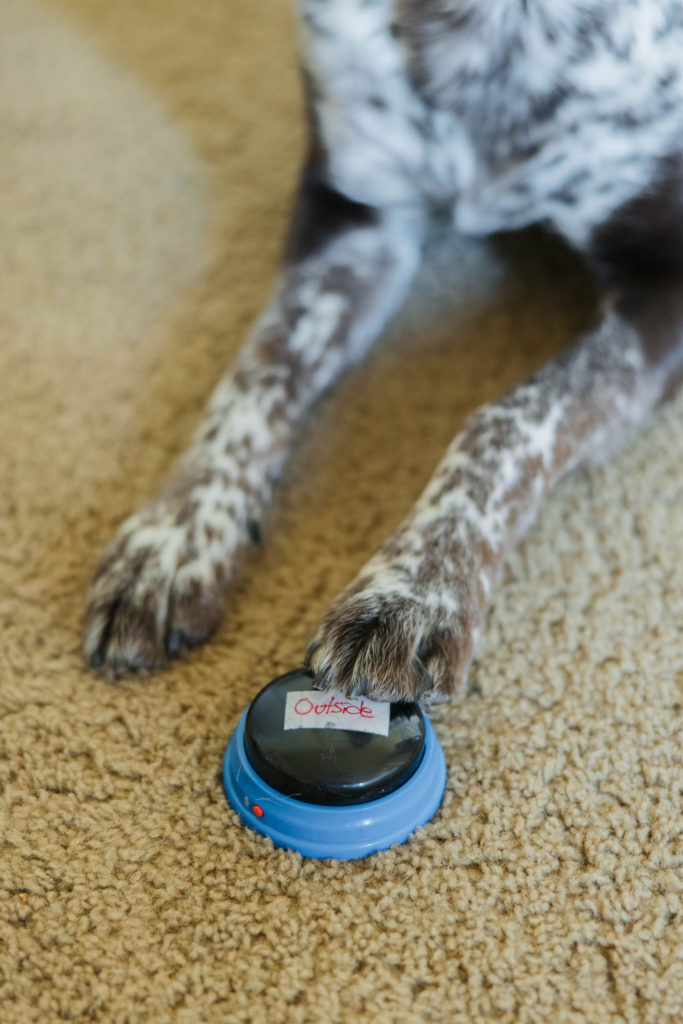
I truly think that Hunger for Words are the best dog communication buttons out there because of all of the amazing support you get through the many resources she provides. Learning how to teach your dog to talk with buttons can seem intimidating when looking from the outside, but once you see the steps broken down alongside the included guides written by Christina Hunger herself, not only is it fun, but it’s completely doable!
Want more dog enrichment ideas? Check out some of my favorite posts featuring some more fun dog enrichment activities like DIY puzzle toys for dogs, Lickimat recipes, KONG filling ideas, and more:
- 3 Easy Dog Lick Mat Ideas
- 3 DIY Dog Treat Dispensers
- 3 DIY Dog Enrichment Ideas To Combat Dog Cabin Fever
- 3 Dog Enrichment Activities Using Toilet Paper Rolls
- 3 DIY Puzzle Toys For Dogs
- 3 Easy Scenting Games For Dogs
- 3 Ingredient Yogurt Dog Treat Recipe With Lickimat Soother
- 3 Snuffle Toys For Dogs
- DIY Snuffle Mat Ball: JW HOLEE Roller Ball Dog Toy Idea
Plus, don’t forget to subscribe to my newsletter to get more dog enrichment ideas delivered straight to your inbox.
Thank you Hunger For Words for sponsoring this post. All opinions are mine.
Photography: Kate Kelley Collection
